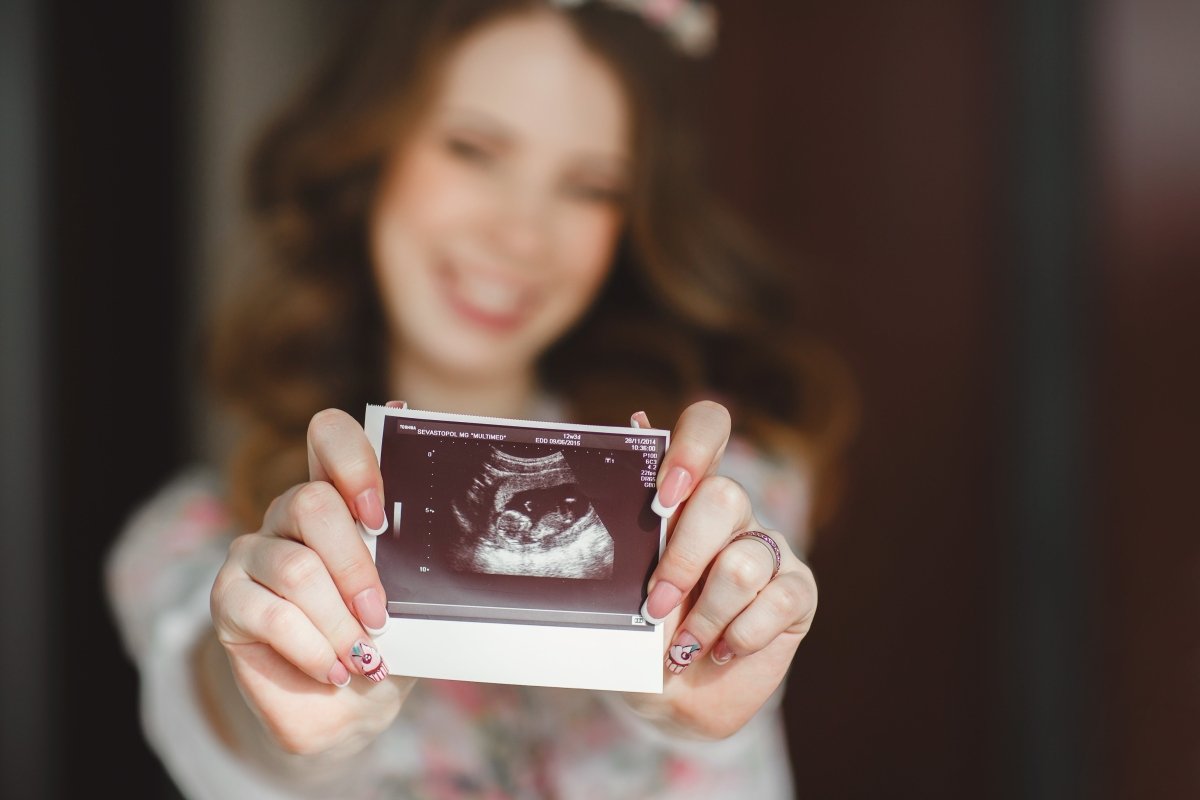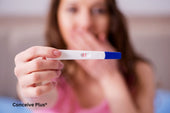How to Tell If Your Pregnant Without a Test and Be Sure of the Signs

A lot of women often ask how to tell if your pregnant without a test and wonder if it's possible to recognize pregnancy just by noticing changes in the body. A missed period is usually the first clue, but there are many other signs that might indicate pregnancy before taking a test. The body starts to go through hormonal shifts that affect things like energy levels, digestion, and even your emotions. Some women realize, "I got pregnant" when they notice these early changes before confirming with a test [1].
If you're trying to conceive, understanding how can you know your pregnant without taking a test can help you identify symptoms early on. Some women start experiencing nausea and fatigue just weeks after conception [2]. But keep in mind—these symptoms aren't always proof of pregnancy. Stress, lifestyle changes, or hormonal imbalances can cause similar symptoms [3].
In this article, we’ll go over how do you know if your pregnant without a test by covering common pregnancy signs, what changes to look out for, and when you should consider taking a test. Plus, we’ll also discuss how to be 100 sure you are not pregnant and what steps to take next if you're unsure.
Early Signs That Might Indicate Pregnancy
If you're wondering how to check if pregnant without pregnancy test or how to determine if pregnant without test, paying attention to physical and hormonal changes might help you get a clue. Below are some of the most common early pregnancy symptoms before taking a test.
1. Missed Period: The Most Common Sign
A missed period is the most obvious sign that you could be pregnant. If your cycle is usually regular and you suddenly skip a period, there’s a good chance pregnancy is the reason. After conception, the body produces human chorionic gonadotropin (hCG), which stops the uterine lining from shedding like it normally would [4].
That said, missing a period doesn't always mean pregnancy. It could also be caused by stress, sudden weight loss or gain, hormonal imbalance, or even excessive exercise. Women with irregular cycles may find it even harder to tell.
If you’re thinking about how to tell if you're pregnant without a test, tracking your period and looking for other symptoms can help, but the best way to be sure is still a pregnancy test. Understanding pregnancy mean helps clarify that it refers to the condition of carrying a developing embryo or fetus within the uterus.
2. Spotting or Light Bleeding
Some women notice light spotting or implantation bleeding in early pregnancy. This happens when the fertilized egg attaches itself to the uterine lining, typically 10 to 14 days after conception. The bleeding is much lighter than a normal period—often pink, brown, or light red—and usually only lasts a few hours to a couple of days.
Since it happens around the same time a period is due, many women mistake it for the start of their cycle. But unlike a period, implantation bleeding doesn’t come with a heavy flow or clots. If you notice light spotting when you’d usually get your period, it could be a sign of pregnancy [5].
For those curious about how can you know your pregnant without taking a test, implantation bleeding—along with other early signs—could be an early clue.
3. Breast Changes
Breast tenderness and changes are another common early pregnancy sign, sometimes showing up one to two weeks after conception. Pregnancy hormones like estrogen and progesterone cause the breasts to feel sore, swollen, or more sensitive [6]. Many women also notice darkening of the areolas and tiny white bumps (Montgomery’s tubercles) becoming more noticeable.
These changes happen because the body is preparing for breastfeeding. Increased blood flow and hormonal activity in the breast tissue can make even slight touches uncomfortable. The soreness might feel similar to what happens before a period, but in pregnancy, it usually lasts longer.
If you’re wondering how do you know if your pregnant without a test, paying attention to breast changes can help. However, since PMS can cause similar symptoms, it’s not always a definite sign.
4. Nausea and Vomiting
Morning sickness is one of the most well-known pregnancy symptoms, affecting up to 80% of women. Despite the name, nausea can hit any time of the day and sometimes starts as early as two to four weeks after conception.
Pregnancy-related nausea is likely caused by rapidly increasing hCG levels, along with rising estrogen and heightened sensitivity to smells [7]. Some women experience mild nausea, while others struggle with extreme vomiting, a condition called hyperemesis gravidarum.
If you're thinking about how to be 100 sure you are not pregnant and you're dealing with persistent nausea, taking a test might be a good idea.
5. Frequent Urination
Finding yourself running to the bathroom more than usual? Frequent urination is an early sign of pregnancy that happens because pregnancy hormones increase blood flow to the kidneys, which leads to more urine production. As pregnancy progresses, the uterus also starts pressing on the bladder, making bathroom trips even more frequent.
While frequent urination can also be caused by drinking more fluids, caffeine intake, or urinary tract infections (UTIs), if it’s paired with other pregnancy symptoms, it could be an early sign [8].
For those wondering how to check if pregnant without pregnancy test, paying attention to changes in bathroom habits can provide a clue.
6. Fatigue and Low Energy
Feeling completely drained even after sleeping all night? Increased levels of progesterone in early pregnancy can make you feel exhausted all the time. This hormone helps support pregnancy, but it also slows down metabolism and can leave you feeling sluggish.
On top of that, the body starts producing more blood to supply oxygen to the growing baby, which can lead to low iron levels and mild anemia [9].
If you’re trying to figure out how to determine if pregnant without test, extreme fatigue along with other symptoms could be a strong sign.
7. Bloating and Constipation
Hormonal changes in early pregnancy can mess with digestion, leading to bloating and constipation. Higher progesterone levels slow down the digestive system, making gas, stomach discomfort, and irregular bowel movements more common.
If you’re wondering how to know if you are pregnant without a test, digestive issues combined with other pregnancy signs might give you a clue.
8. Cramping Without a Period
A lot of women feel mild uterine cramping in early pregnancy. It kinda feels like the cramps you get before your period, but usually they’re lighter, shorter, and way less painful. These cramps happen because the uterus is expanding and stretching to make space for the growing embryo.
The tricky part? Some women mistake these cramps for the start of their period and don’t even realize they might be pregnant. If you're paying attention and wondering how to know if your pregnant without taking a test, keeping track of cramping patterns can help. If the cramps don’t lead to a period and come with other pregnancy signs, well… could be a clue.
9. Mood Swings and Irritability
One moment you're laughing. The next, you're crying over a commercial. Sounds familiar? That’s pregnancy hormones doing their thing. Estrogen and progesterone mess with neurotransmitters in the brain, which control mood [10]. This can cause random irritability, anxiety, or just feeling all over the place emotionally.
For those wondering how to know your pregnant without a test, sudden emotional rollercoasters, especially with other symptoms, might be a hint. But let’s be real—mood swings can also happen due to PMS, stress, or just life.
10. Changes in Smell and Taste
Ever walked into the kitchen and bam!—suddenly, the smell of coffee makes you wanna throw up? Or maybe your favorite meal suddenly tastes like cardboard? Yeah, that’s early pregnancy for you. Many women develop a super-sensitive sense of smell or notice weird taste changes, thanks to hormone shifts.
Cravings or sudden food aversions are also common. You might suddenly need pickles at 3 a.m. or, for no reason, hate the smell of something you used to love.
If you're wondering how to know your pregnant without taking a pregnancy test, these unexpected food and smell changes—along with other symptoms—might be a big hint.
11. Back Pain
Oh, the joys of pregnancy! That lower back pain? It might start earlier than you think. Thanks to hormonal changes and ligament loosening, many women experience dull, achy back pain even before they realize they’re pregnant.
This happens because the body releases relaxin, a hormone that softens ligaments and joints to prepare for pregnancy. More blood flow and fluid retention don’t help either. Some women confuse this with pre-period back pain, but if it sticks around longer than usual, it could be something more.
If you're trying to figure out how to tell if im pregnant without a test and you have unexplained back pain along with other symptoms, pregnancy might just be the reason.
12. Headaches and Dizziness
Feeling lightheaded? Headaches showing up out of nowhere? Another pregnancy symptom that catches some women off guard. In early pregnancy, estrogen and progesterone levels increase rapidly, changing blood circulation and blood pressure [11]. This can lead to dizziness and headaches, especially if you're not drinking enough water or getting enough nutrients.
If you've been asking yourself how to tell your pregnant without a pregnancy test and you’re suddenly dizzy more often or getting headaches, it could be one of the many early signs. But if the headaches are severe or don't go away, it’s smart to check in with a doctor.
13. Nasal Congestion
Okay, this one’s weird, but it's real. Pregnancy can actually make your nose stuffy! Ever heard of pregnancy rhinitis? Higher estrogen levels can cause nasal membranes to swell, leading to a constantly stuffy or runny nose—even when you're not sick.
For some women, this symptom shows up super early and sticks around for months. It can make sleeping hard and even cause random nosebleeds.
If you’ve been questioning how you know your pregnant without taking a test and you suddenly feel like you have allergies but don’t, it might be pregnancy instead.
14. Low Libido
Some women go through pregnancy feeling zero interest in sex, while others experience the exact opposite. Blame it on hormonal fluctuations, nausea, and fatigue. If you suddenly have no desire for intimacy—even though nothing else has changed—pregnancy might be the cause.
For women wondering how to know if you are pregnant without a test, a noticeable dip in libido—along with other symptoms—can be a sign.
15. Skin and Hair Changes
Pregnancy can totally change your skin and hair. Some women get that famous "pregnancy glow", thanks to increased blood flow and oil production. Others? Not so lucky—hormones can trigger acne, making skin feel oily, dry, or just different than usual.
Hair texture can change too. Some women notice thicker, shinier hair, while others experience more shedding than usual. The good news? These changes usually go back to normal after pregnancy.
If you've been asking how to know your pregnant without a test and suddenly have weird skin breakouts or major hair changes, pregnancy could be the reason.
16. Increased Body Temperature
If you track your Basal Body Temperature (BBT) for fertility, you might notice it stays high after ovulation instead of dropping. Normally, BBT rises after ovulation and then falls back down if pregnancy doesn’t happen. But if it stays elevated for 14+ days, it might mean you’re pregnant.
For those wondering how to know your pregnant without taking a pregnancy test, tracking BBT for a couple of weeks can give a good hint.
How to Be 100% Sure You Are Not Pregnant
Still asking yourself how to know your pregnant without taking a pregnancy test but need absolute certainty that you're not pregnant? The only real way to be 100% sure is to get tested—but there are a few things you can do to double-check before heading to a doctor.
- Take a Home Pregnancy Test – This is the quickest and easiest way to check. For best results, test first thing in the morning when your urine is most concentrated. If the test is negative but you still have symptoms, wait a few days and try again.
- Consult a Doctor – If you're unsure or still worried, a blood test at a clinic can confirm pregnancy even earlier than a urine test. A doctor might also check for hormonal imbalances that could be causing pregnancy-like symptoms.
- Track Your Cycle – If your periods are irregular, it can be tricky to tell whether you've actually missed one. Keeping track of ovulation using a calendar or an app can help you understand what's going on with your cycle.
If pregnancy isn’t the cause of your symptoms, other factors like stress, diet changes, or hormone imbalances could be at play. But if in doubt? Always test.
The Bottom Line
So, can you figure out if you're pregnant before taking a test? Yes and no. While it's totally possible to pick up on early signs, the reality is—no single symptom can confirm pregnancy for sure.
It’s understandable why so many women ask how to tell if your pregnant without a test—waiting to take one can feel like forever. But the truth is, symptoms like nausea, fatigue, mood swings, and bloating can be caused by other things too. That’s why tracking multiple symptoms at once and paying attention to patterns in your body is key.
FAQs
How you know your pregnant without taking a test?
You might notice signs like missed periods, nausea, mood swings, or fatigue—but no symptom alone can confirm pregnancy. The only real way to know? Take a test or visit a doctor.
How to know your pregnant without taking a pregnancy test?
Early pregnancy symptoms like implantation bleeding, heightened smell sensitivity, and sore breasts may suggest pregnancy, but testing is still necessary to be sure.
Can I be pregnant without symptoms?
Absolutely! Some women don’t feel any symptoms early on, while others experience several at once. The only way to confirm pregnancy is through a test or medical checkup.
When should I take a pregnancy test?
It’s best to wait at least one week after a missed period for the most accurate result. Testing too early can lead to false negatives.
How to know if your pregnant without taking a test?
Symptoms like frequent urination, dizziness, bloating, and cramping can be early signs, but they’re not enough to confirm pregnancy. If in doubt? Get tested!
Citations
- American Pregnancy Association. (2023). Early Signs of Pregnancy. Available at: https://americanpregnancy.org/pregnancy-symptoms/early-signs-of-pregnancy/
- Mayo Clinic. (2023). Symptoms of Pregnancy: What Happens First. Available at: https://www.mayoclinic.org/healthy-lifestyle/getting-pregnant/in-depth/symptoms-of-pregnancy/art-20043853
- NHS. (2023). Signs and Symptoms of Pregnancy. Available at: https://www.nhs.uk/pregnancy/trying-for-a-baby/signs-and-symptoms-of-pregnancy/
- Wilcox, A. J., et al. (1999). Timing of Implantation of the Conceptus and Loss of Pregnancy. New England Journal of Medicine. Available at: https://pubmed.ncbi.nlm.nih.gov/10362823/
- Healthline. (2022). What Is Implantation Bleeding? Available at: https://www.healthline.com/health/pregnancy/implantation-bleeding
- Lawrence, R. A., & Lawrence, R. M. (2016). Breastfeeding: A Guide for the Medical Profession. Elsevier Health Sciences. Available at: https://shop.elsevier.com/books/breastfeeding/lawrence/978-0-323-68013-4
- Jewell, D., & Young, G. (2003). Interventions for Nausea and Vomiting in Early Pregnancy. Cochrane Database of Systematic Reviews. Available at: https://pubmed.ncbi.nlm.nih.gov/14583914/
- Habak PJ, Carlson K, Griggs, Jr RP. Urinary Tract Infection in Pregnancy. Available at: https://www.ncbi.nlm.nih.gov/books/NBK537047/
- Centers for Disease Control and Prevention. (2023). Recommendations to Prevent and Control Iron Deficiency in the United States. Available at: https://www.cdc.gov/mmwr/preview/mmwrhtml/00051880.htm
- Hendrick, V., et al. (1998). Hormonal Changes in the Postpartum and Implications for Postpartum Depression. Psychosomatics. Available at: https://pubmed.ncbi.nlm.nih.gov/9584534/
- Negro, A., Delaruelle, Z., Ivanova, T. A., Khan, S., Ornello, R., Raffaelli, B., Terrin, A., Reuter, U., Mitsikostas, D. D., & European Headache Federation School of Advanced Studies (EHF-SAS) (2017). Headache and pregnancy: a systematic review. The Journal of Headache and Pain. Available at: https://pmc.ncbi.nlm.nih.gov/articles/PMC5648730/



















